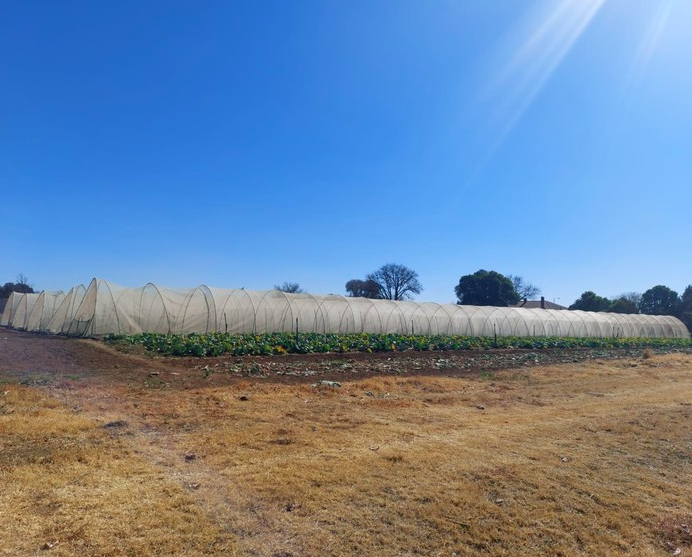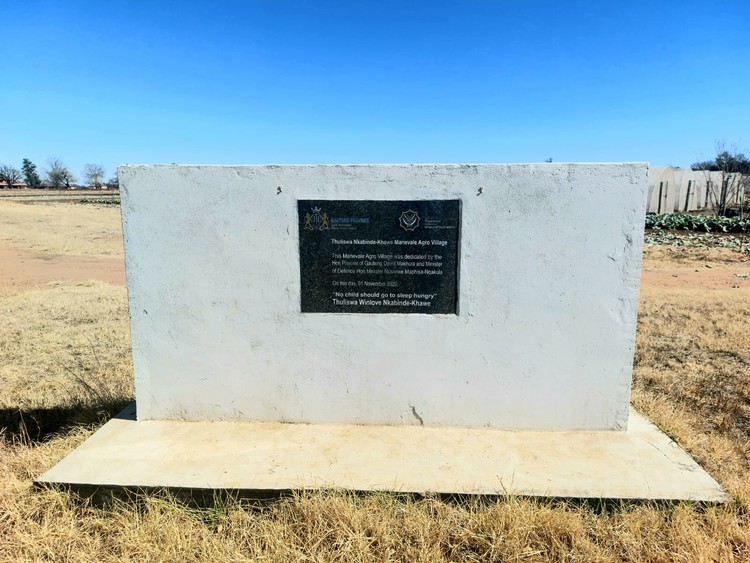The vegetable farming project at Marievale military base, where the crop of cabbages have rotted on the ground. Photo supplied
By Joseph Bracken, Raymond Joseph, Kimberly Mutandiro and Daniel Steyn
- Daracorp, a non-profit established in 2019, has received R54-million to initiate scores of small agricultural projects in Gauteng.
- Daracorp received the funding during a period when the department was cutting funding from other established NGOs.
- Five organisations where Daracorp set up the projects, say Daracorp did not deliver on their promises.
- One organisation said the project never got off the ground at all.
An agricultural project at the Marievale military base on the East Rand, part of a multi-million rand initiative funded by the Gauteng Department of Social Development, has resulted in what appears to be little more than a failed home garden.
The initiative run by Daracorp, a non-profit organisation established in 2019 that received R54-million in funding from the Gauteng Department of Social Development (GDSD) over three years, is located inside the military base near some old houses previously occupied by non-military community members. The community members were brutally evicted by the army in 2017.
According to Chris Koitsioe, a former soldier and leader of the evicted community, the army wanted them moved in order to make way for the agricultural project, at which 30 residents of the Duduza township in Nigel, along with a number of military veterans, were appointed to work. None of the evicted Marievale community members were employed on the project.
A plaque commemorating the launch of the Thulisiwe Nkabinde-Khawe Marievale Agro Village, a project of the Department of Defence and the Gauteng Government launched on November 1, 2020 stands close by.
Koitsioe said an army truck would ferry the township residents to and from the project on a daily basis.
“We questioned why the army said they wanted to use the place as a camp for the army when we were evicted, but suddenly they started farming at the place where we were,” Koitsioe said.
But he said the Duduza residents stopped working on the project “due to non-payment”, leaving it in the hands of only the military veterans.
GroundUp has established the farming area is not much bigger than a large vegetable garden consisting mostly of cabbages which have been left to rot in the ground.
A Daracorp employee – who would not give his name – said he was the only member of the company’s staff working at the base. He said the harvest had spoiled because something had gone wrong during the planting season, and the cabbages were not fit for consumption.
He said the agricultural initiative was now being run as a military project, and GroundUp should contact Daracorp for more information.
GroundUp managed to speak to people working at the base who said a handful of soldiers worked on the project in their spare time. They said that it appeared “a lot of money” had been poured into it but it did not create jobs for people in the area. A Daracorp sign at the base had “recently been removed”.
Daracorp director Lennox Mavuwa said as of 18 July, “the beneficiaries were clearing the land in preparation to plant in the first week of September”. Mavuwa said information that the harvest was rotting was “incorrect”.
He insisted that once the produce was harvested, the beneficiaries sold it to buyers which included Spar, Food Lovers Market, and Boxer.
Daracorp failed to provide the exact locations of each store they supplied, but the two closest Spar locations, Spar Dias and Spar Selcourt, told GroundUp they do not buy produce from Daracorp or the military base.
Spokesperson for Boxer, Jason McCall, said no Boxer store is affiliated with Daracorp or the military base.
A plaque at the Marievale vegetable farming project states the Thuliswa Nkabinde-Khawe Marievale Agro Village was dedicated by Gauteng Premier David Makhura and Defense Minister Nosiviwe Maphisa-Nqakula on 1 November 2021. Photo supplied
Scores of sites
Marievale is just one of between 25 and 44 sites where Daracorp claims it has established agricultural projects in Gauteng, for which they received R54-million from the GDSD – their sole funder – from the 2021/22 to 2023/24 financial years.
Uncovering how many such projects Daracorp was responsible for initiating proved difficult, as Daracorp’s own numbers kept changing.
What is established is that in the first year, Daracorp received R3.75-million from the department. This jumped to almost R24-million more under the Women’s Development Programme. In the last financial year, Daracorp received R26.1-million.
This was during a period in which the GDSD had cut back on grants to other organisations it funded. Daracorp received one of the largest payouts from the GDSD in 2022/23 while most other organisation got less than R1-million out of the almost R2.3-billion funding budget.
In December Daracorp sent GroundUp a list of 36 operational sites with 711 beneficiaries. Yet Daracorp’s website lists 25 sites. Then Mavuwa, in response to subsequent questions, said there are currently 44 sites in Gauteng.
GroundUp managed to contact 20 of the organisations listed as being funded through Daracorp to run the agricultural projects at various sites. Eight did not respond. All 12 that did respond asked to remain anonymous for fear of not receiving future funding, including the six which said they were satisfied with the services Daracorp provided.
Five organisations, however, claimed Daracorp had failed to deliver on key aspects of the agreements they had signed, with one of them saying the project was never initiated at all.
Some of the complaints were late delivery of seedlings resulting in delayed planting of crops; non-delivery of promised personal protective equipment (PPE); failure to build growing tunnels as promised; failure to conduct soil testing; and failure to deliver on soil preparation.
With the exception of projects at Marievale and the Lenasia military bases, the projects are all based at non-profit organisations, including child and youth care centres.
Beneficiary woes
One of the five dissatisfied organisations said Daracorp had promised it would train the beneficiaries, supply PPE, and build a grow tunnel. They said training and some tools were supplied, but no tunnels, nor PPE, was forthcoming.
In response, Mavuwa said Daracorp delivered 39 tunnels to allocated sites between February 2022 and January 2024. The only beneficiaries who were denied tunnels had already reached their allocation of tunnels or had leased land for too short a time to make the construction of infrastructure feasible. And he said some sites were not allocated tunnels.
The director of another organisation said the agreement between them and Daracorp included testing soil for agricultural purposes and turning soil for planting preparation.
“To date, every effort [has] failed. Only [the] training happened, along with other centres in our region that were mandated by [GDSD].”
After the alleged failure of the project, the organisation complained to the regional office of the department to make them aware of the situation, said the director.
Another organisation said it was left in debt after failing to meet client orders on time, which they blamed on Daracorp.
The director of the organisation said it had taken three weeks for Daracorp to send a tractor to work the land, two to three weeks for seedlings to arrive, and another three months for PPE to arrive.
“It led to clients cutting ties with us. And, most of all, it left our beneficiaries discouraged. Promises were made but not fulfilled.”
Mavuwa blamed the delay in delivering seedlings on the “ordering timelines” from reputable nurseries.
“We did the testing for our production planning and the results are available on request to the programme participants,” said Mavuwa.
He asked for the names of the sites which provided negative feedback. GroundUp could not provide these names as the organisations stressed they would only speak anonymously.
Lack of transparency
Daracorp uses a shared equipment model with central procurement to keep costs down, according to Mavuwa.
Asked for a breakdown of its own overheads and expenses, Mavuwa said he was unable to disclose any financial information due to the confidentiality agreement in their service level agreement (SLA) with the GDSD.
While GroundUp has not seen the SLA between GDSD and Daracorp, SLAs with other organisations seen by GroundUp do not contain confidentiality clauses.
Several beneficiaries complained Daracorp never shared their project budget, which made it difficult to know how much money was allocated. This was also due to the confidentiality clause, said Mavuwa.
But he said progress with the organisations was tracked through a memorandum of understanding, “not through a budget”.
A large portion of Daracorp’s funding was through the GDSD’s Women’s Development Programme. But Mavuwa declined to say how many of the projects’ beneficiaries were women. He said information about individual beneficiaries could only be released by the department.
Forensic audits
For the 2024/25 financial year, Daracorp’s funding from the department was suspended due to a forensic investigation. Mavuwa said the auditing firm, FSG Africa, had visited all Daracorp’s sites and Daracorp has “fully cooperated”.
The GDSD’s forensic audits flagged 51 organisations they funded, but 34 of these have since been officially cleared.
Mavuwa told GroundUp that Daracorp has also been cleared, but they were waiting for an official confirmation letter.
“It is important to note that the investigation report did not include findings of any fraud or corruption as alluded to in the past media coverage Daracorp has received,” he said.
GroundUp attempted, via phone calls and WhatsApp messages, to contact FSG CEO Vernon Naidoo about the outcome of its investigation into Daracorp, but no response was received.
The GDSD did not respond to questions. In a media briefing on Sunday, the acting head of department Bongani Ngomane said the department had received legal opinion that it should not respond to media queries related to the forensic investigatons.
Until recently, the department was Daracorp’s sole funder. However, due to investigations following earlier reporting, Daracorp had to take on three other funders, Mavuwa said. But he declined to disclose the names of these funders. Mavuwa said it has been able to support the majority of its projects even without the department’s funding.
Follow African Insider on Facebook, X and Instagram
Picture: GroundUp
For more African news, visit Africaninsider.com



